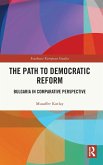The first book to analyse the EU's decision to agree to eastern enlargement Discusses EU enlargement policies in a coherent theoretical framework Combines a well-developed and original analytical framework with in-depth empirical analysis Includes case studies on trade liberalisation, regulatory alignment, and foreign policy consultations
This book examines the two main dimensions of the European Union's enlargement to eight central and eastern European countries (CEECs) in 2004. Why did the EU agree to enlargement, despite the costs for some incumbents who have veto-power? How can we explain the (uneven) pattern of accommodation of the CEECs' preferences in concrete policies? Combining in-depth empirical analysis with an original theoretical framework, which draws on insights from constructivism and historical institutionalism, this book focuses on the EU's discursively constructed role-identity vis-à-vis the CEECs. This role-identity forged a group of policy advocates inside the European Commission, who promoted the CEECs' preferences inside the EU, and induced a path-dependence into the enlargement process. The impact of EU identity on concrete policies was less direct. Case studies on trade liberalisation, regulatory alignment, and foreign policy consultations demonstrate that sectoral policy paradigms are a key factor that mediates the influence of the policy advocates on specific policy areas.
Hinweis: Dieser Artikel kann nur an eine deutsche Lieferadresse ausgeliefert werden.
This book examines the two main dimensions of the European Union's enlargement to eight central and eastern European countries (CEECs) in 2004. Why did the EU agree to enlargement, despite the costs for some incumbents who have veto-power? How can we explain the (uneven) pattern of accommodation of the CEECs' preferences in concrete policies? Combining in-depth empirical analysis with an original theoretical framework, which draws on insights from constructivism and historical institutionalism, this book focuses on the EU's discursively constructed role-identity vis-à-vis the CEECs. This role-identity forged a group of policy advocates inside the European Commission, who promoted the CEECs' preferences inside the EU, and induced a path-dependence into the enlargement process. The impact of EU identity on concrete policies was less direct. Case studies on trade liberalisation, regulatory alignment, and foreign policy consultations demonstrate that sectoral policy paradigms are a key factor that mediates the influence of the policy advocates on specific policy areas.
Hinweis: Dieser Artikel kann nur an eine deutsche Lieferadresse ausgeliefert werden.








